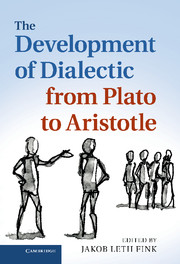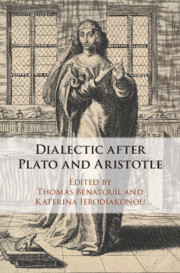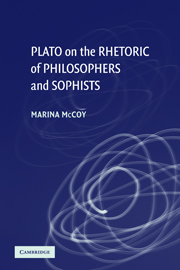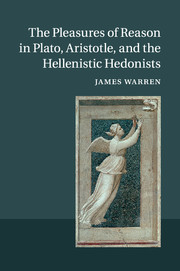The Development of Dialectic from Plato to Aristotle
$139.00 (C)
- Editor: Jakob Leth Fink, University of Copenhagen
- Date Published: December 2012
- availability: Available
- format: Hardback
- isbn: 9781107012226
$
139.00
(C)
Hardback
Other available formats:
eBook
Looking for an examination copy?
This title is not available for examination.
-
The period from Plato's birth to Aristotle's death (427–322 BC) is one of the most influential and formative in the history of Western philosophy. The developments of logic, metaphysics, epistemology, ethics and science in this period have been investigated, controversies have arisen and many new theories have been produced. But this is the first book to give detailed scholarly attention to the development of dialectic during this decisive period. It includes chapters on topics such as: dialectic as interpersonal debate between a questioner and a respondent; dialectic and the dialogue form; dialectical methodology; the dialectical context of certain forms of arguments; the role of the respondent in guaranteeing good argument; dialectic and presentation of knowledge; the interrelations between written dialogues and spoken dialectic; and definition, induction and refutation from Plato to Aristotle. The book contributes to the history of philosophy and also to the contemporary debate about what philosophy is.
Read more- Addresses issues currently at the forefront of international research in philosophy
- Proposes a combined view of dialectic in Plato and Aristotle
- Investigates methodology and the interaction between written dialogue and spoken dialectic
Customer reviews
Not yet reviewed
Be the first to review
Review was not posted due to profanity
×Product details
- Date Published: December 2012
- format: Hardback
- isbn: 9781107012226
- length: 364 pages
- dimensions: 229 x 152 x 21 mm
- weight: 0.66kg
- contains: 1 b/w illus.
- availability: Available
Table of Contents
Introduction Jakob Fink
Part I. Dialectic as Interpersonal Activity:
1. Self-refutation and dialectic in Plato and Aristotle Luca Castagnoli
2. The role of the respondent in Plato and Aristotle Marja-Liisa Kakkuri-Knuuttila
3. Division as a method in Plato Hallvard Fossheim
Part II. Form and Content in the Philosophical Dialogue:
4. Dialectic and dialogue in the Lysis Morten S. Thaning
5. The Laches and 'joint search dialectic' Holger Thesleff
6. The philosophical importance of the dialogue form for Plato Charles H. Kahn
7. How did Aristotle read a Platonic dialogue? Jakob L. Fink
Part III. Dialectical Methodology:
8. What is behind the ti esti question? Vasilis Politis
9. Socratic induction in Plato and Aristotle Hayden W. Ausland
10. Aristotle's definition of elenchus in the light of Plato's Sophist Louis-André Dorion
11. The Aristotelian elenchus Robert Bolton
12. Aristotle's gradual turn from dialectic Wolfgang Kullmann.
Sorry, this resource is locked
Please register or sign in to request access. If you are having problems accessing these resources please email [email protected]
Register Sign in» Proceed
You are now leaving the Cambridge University Press website. Your eBook purchase and download will be completed by our partner www.ebooks.com. Please see the permission section of the www.ebooks.com catalogue page for details of the print & copy limits on our eBooks.
Continue ×Are you sure you want to delete your account?
This cannot be undone.
Thank you for your feedback which will help us improve our service.
If you requested a response, we will make sure to get back to you shortly.
×



